Syria’s Foreign Minister Faisal Mekdad is in Iran this week, where he told his counterparts that Syria will respond to Israeli attacks in Syria.
“We are responding to these attacks every day,” Medad said, according to reports in Iranian media. He noted that the “Israeli regime’s attacks on Syria could not go unanswered,” Tasnim news said. “Those who attacked Syria are the enemy of Syria and they supported the terrorists. Israel is doing this today. Maybe today’s answer is different from tomorrow and today’s answer is different from yesterday.”
He said Syria is responding in “various ways.” He claimed Syria is pursuing “terrorists,” which apparently refers to Syria’s regime cracking down on former Syrian rebels in southern Syria near the Golan.
“Some expect the response to the airstrikes, but Israel should not forget that Syria may waive such attacks, but it will not forget the essence of the issue.... Israel should misunderstand and should know that these attacks will be answered,” he said.
These threats took place as he met with Iranian Foreign Minister Hossein Amir-Abdollahian. They focused on strategic relations between the two countries.

“Iran condemns the presence of foreign forces in Syria, which was done without coordination with the Syrian government. We welcome the review of the foreign policy of some Arab and European countries and the recent visits to Damascus and the reopening of some embassies,” the Iranian said. Amir-Abdollahian also said: “We had a detailed discussion about Afghanistan and we agree on the need to form an inclusive government in Afghanistan.”
Abdollahian slammed Israel and claimed the “Zionist regime” has carried out attacks on Syria. “The fake and terrorist regime of Israel is the root of insecurity in the region and in West Asia.” He then referenced the recent peace deals between Israel and the Gulf. He also said he hoped the Iranian president would soon meet Syria’s president. Mekdad invited the Iranian president.
“Economic relations between Iran and Syria were the focus of the talks, and we talked about them during the meeting with the [Iranian] president and Amir-Abdollahian,” Mekdad said, adding that talks between Afghanistan and Iraq had also taken place.
This last reference is interesting. The Iranian also mentioned recent clashes on the border with Afghanistan. Iran’s IRGC has recruited Afghan Shi’ites to fight in Syria. It may be that Syria and Iraq are now paying more attention to Afghanistan. This is part of an eastern shift in which all these countries are looking to China and the East.
“I think our region will see new developments in the future,” Amir-Abdollahian said. “According to messages and statements from US officials, they have no choice but to leave the region.” The report of the meeting hints that the US might withdraw from another place in the “coming weeks or months.” It is not clear if Iran and Syria think the US might leave the Tanf garrison or some other location or if this is a hint that Iran may plot new attacks against the US in Iraq or Syria.
Iran called for countries to help reconstruct Syria. Mekdad “stated that it may be thought that Syria has overcome the past and economic problems, but this is not the case: Syria attaches special importance to relations with Iran and paves the way for Iran’s participation in economic projects it has done. We welcome any Iranian participation in Syria.”
Iran also told Syria it was negotiating in Vienna with Western governments to get sanctions lifted. The point of this is that sanctions relief could help Syria. The Iranian foreign minister added, “The three European countries did not take any initiative in these negotiations, as if they were looking to evaluate our team.” He said, “Until the last moment, three European countries could not present an operational plan and idea.”
Iran then slammed Western media.
“During the negotiations, some media and lobbies tried to insinuate that Iran has started 90% enrichment.” Iran says this is “pure fabrication and lying.”
Iran has also said it rejects an interim agreement in Vienna. He added that “negotiations will resume soon... we are looking for a good agreement and we expect the other side to take such an approach.” Amir-Abdollahian also called the UAE foreign minister’s visit to Damascus a courageous step, adding, “We will take the next steps based on this step... we hope that other Arab countries will.”
These are important points. It shows that Syria and Iran believe a new dawn may be emerging amid reconciliation with the Gulf states. It also means Iran is optimistic about talks in Europe, even though it may also be preparing to lay the groundwork for a chance at failure.
